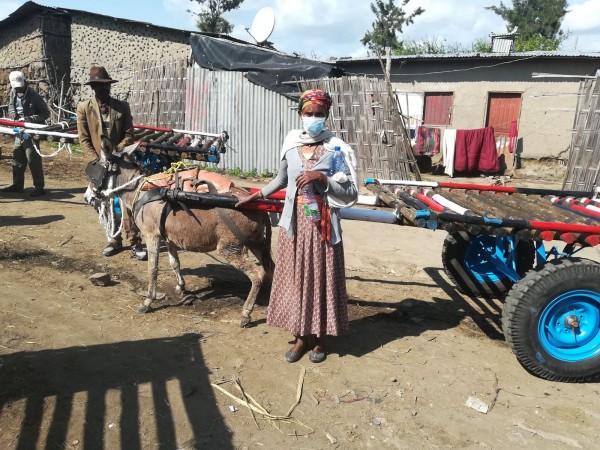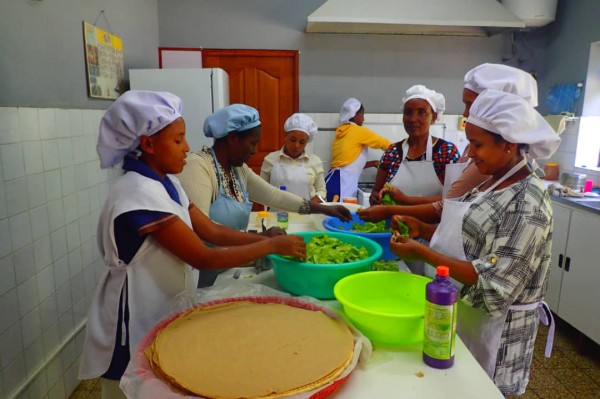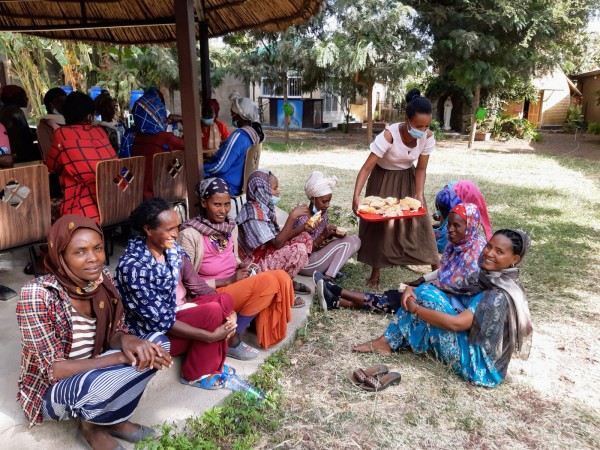
I have much admiration for the sky, also for the arms, but above all I have a deep admiration for women. This African proverb, where women, arms and sky are so united and interact in such a simple, respectful and unanimous way to support the sky, is my favorite proverb and the one that best represents all the women who share arms and sky in Meki, Ethiopia.
The Meki sky in which we live is made up of many women who, in a simple, constant and often barely noticeable way, make a lot of noise. It is a constant noise, full of affection, kindness, but also impertinent and full of rebellion, anger and non-acceptance of the many responsibilities and few rights with which they have to live. They make a special noise, they don’t go quiet, nobody silences them, and they are changing many things, many lives, beginning by their own.
We met many of them just a year ago. They had lost work, home and family with the arrival of the pandemic. Now they are called “women in situations of extreme vulnerability”. And yes, they were very vulnerable. When they were invited to be part of a new project, many of their faces were transformed, they recovered their smiles and also the hope they had lost. They joined the Savings Groups with other women who shared and understood the serious difficulties they were going through. And they felt that they were once again trusted, that they were offered a new opportunity to start businesses, also helping them with the most basic and essential things they needed: health, decent housing, and schooling for their children.
And from there—they began to dream again, and their dreams are now real. They are proud of the achievements made, of the initiatives undertaken, and they have self-confidence again. And by sharing in the meetings of the Savings Groups the occasions of sexist violence that many of them continue to suffer, they get angry, support each other and fight because they know they deserve to be treated with respect and dignity. All these women with whom I live and share daily work continue to support the sky of Meki, and continue to make a constant noise, not shrill but persistent, to move forward together. They are being an example for many others.
And as another African proverb says, "the footprints of people who walked together are never erased". I will continue to work so that there are more and more traces and noises of women who continue to demand change, transforming lives.
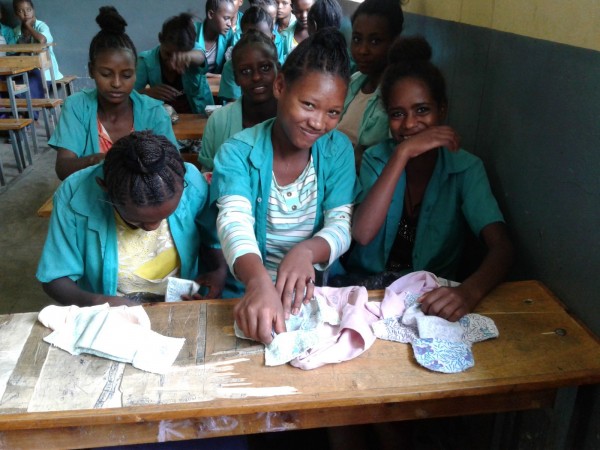
We all know that we live in a world defined by capitalism’s economic model, where almost all of our activity is focused on work, on how to obtain money to live. Our power to purchase goods marks our lifestyle, our customs and habits, our relationships and even the development of our capacities. And in this world, women have an added challenge.
We know what happens to us when we have our menstrual period: tiredness, pain, moodiness, susceptibility and, what is worse, bleeding. Despite this, with a pill to control the pain, perhaps another to control the changes of mood, and a good sanitary napkin, tampon, or other device, we can move on and continue with all our responsibilities. I am not going to focus on the extra expense that this entails. We are not born with these pills in our hands, nor are we born with pads. We must but them, and depending on which product, we even pay VAT! So, being a woman carries additional expense.
What I have just described is what we do in Spain or in any other developed country. But what about developing countries? What happens in Ethiopia? What happens to teenagers who study in the rural schools of Meki, where we work?
What happens to them is exactly what happens to us, with the difference that they have no resources for the "magic pills" or to buy sanitary napkins.
It is common to see girls who fall asleep in class, or who seem to be somewhere else, who do not play at recess or do not participate in any conversation. They have experienced menstruation for the first time, which for them is a taboo subject; suddenly they are no longer girls but women, because they can have children. Society looks at them differently, and they need time to integrate all these changes.
In addition to the reactions listed above, the most frequent result we see is that they skip class. Most teenage girls are absent from school about three days a month, due to their period. Why? Some reasons are cultural: shame, taboo, a sense of impurity. Others would be the same any woman in developed countries would have to face if they did not have a “women's kit”: they are not feeling well, and they do not have the means to control blood loss. Perhaps the days they miss class are precisely the days of the final exams. Or they missed the class on the topic that comes up in the exams. Or they simply lost the thread of the history of their country and now it is more difficult for them to follow the explanations from teacher.
In the “Classrooms for Equality” project, which we carry out in three rural schools in Meki, we talk to the students about respect for human rights, about those daily situations that arise, which are detrimental to these rights and in which women, unfortunately, are usually the most directly harmed.
In addition to these educational sessions, we want to address the problem of girls who miss school due to menstruation. It is not fair that a girl does not pass the exams because she has not been able to do them, or because her attendance at her class has been irregular and she has gaps in the knowledge learned. And this has an immediate solution.
The “Girl’s Clubs” are groups that are organized in the schools. It is an initiative that is carried out in several African countries and that has had a very good response. It consists in forming groups of teenage girls, with a teacher as a leader or person in charge, who meet biweekly and in which topics on women's health, adolescence, body changes such as menstruation, their taboos, and beliefs are debated. They also discuss their rights as women, the inherent equality they should enjoy in regard to their male classmates, and they can present their doubts and concerns. They also prepare short theatrical representations about situations of inequality that occur in their daily life, and which they exhibit, with great success, during the school festival, on the end of the academic year.
We wanted to support them with other complementary activities, such as group dynamics to reinforce their self-esteem, or with the preparation of sanitary napkins.
In rural areas a pack of pads, which are not always on sale, is very expensive and girls cannot afford them. Thus, normally women wear a rough piece of fabric or just avoid leaving their homes. What we propose to do for the girls in the teenage groups is a workshop in which they learn to make washable and reusable sanitary napkins. Making a pad of this type can cost the same as a conventional pack with the difference that the expense is made once or twice a year, depending on the use and care. In addition, we give them women’s underwear and a bar of soap to wash them. In the workshop we use a sanitary napkin already made as a model, and they follow the steps until they are completed. Obviously, not all of them have the same skill in sewing, but with practice they improve. We teach them how to use them and how to maintain proper feminine hygiene. In addition, and in coordination with the health education and first aid program that we also carry out in schools, we provide them, when they need it, with medications to relieve pain so that they can attend classes with a better disposition.
And thus they already have the “women's kit”, ready for school, ready for work, and ready to continue overcoming obstacles in the race for a dignified life, a life in which there may be equal opportunities for everyone.
The CSP has established a donkey and cart distribution project to reduce overwork for women in the rural area of Meki
We have recently started a new project in Ethiopia: the purchase and distribution of forty donkeys and carts for women who belong to the savings groups in the rural area of Meki. The project wants to facilitate and reduce overwork for these women, and at the same time be an income-generating activity.
Now it is the donkeys who carry market products, firewood and water in their carts, make travel in rural areas more bearable, and also generate income for their owners by carrying bags and people on market days in the Meki city (becoming a sort of a minibus). When the donkeys breed, the new calf will be assigned to another of the women, thus giving continuity to the project. The new group of forty women who in 2021 will receive new donkeys and carts has already been selected. We are very happy for all of them.
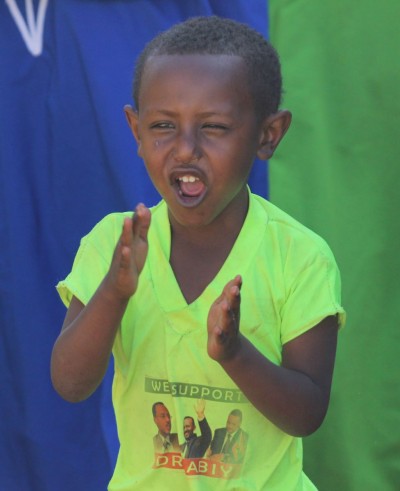
In 1890 Italy annexed Eritrea as its colony (it was the first Italian colony in Africa), and remained in the region until 1941, when during the Second World War Italy lost its occupied territories to the Allied forces. Then Britain took over, and Eritrea was under British domination until 1952. After that, Eritrea became a federated state of Ethiopia, but Emperor Haile Salassie kept reducing Eritrean autonomy until the country became just another region of Ethiopia. As a reaction, in the early 60s different Eritrean groups began the fight for their independence.
The conflict (with all kinds of struggles, battles and thousands of displaced people) lasted until 1991, the year in which a referendum was held in Eritrea, whose result was, in 1993, the proclamation of its independence. However, the territorial boundaries between the two states remained to be clarified, and disagreements over border control resulted in a warlike conflict in 1998.
In 2000, Ethiopia managed to occupy a quarter of the disputed territories, which led to the surrender of the Eritrean army and the signing of a peace treaty in Algiers, mediated by the UN. This agreement established the sovereignty of the disputed territories. Ethiopia, although initially agreed with the treaty, was not willing to cede the Badme region, and consequently the conflicts continued in this area after the peace agreement.
The two countries remained isolated from each other, with borders closed and the impossibility of anyone moving between them. Families with members on both sides of the border had no way of visiting, and not even communicating with each other. The Ethiopian episcopal conference, which covers Ethiopia and Eritrea, had to meet in Rome!
This painful situation ended last year, 2018, at the initiative of the current Ethiopian President, Dr. Abiy Ahmed Ali, who decided to meet with his Eritrean counterpart to sign a document declaring the end of the state of war, and to make the Algiers peace agreement effective.
This achievement is the main reason why Abiy Ahmed Ali has been honored with the 2019 Nobel Peace Prize, which was announced on October 11. The prize was proudly received by millions of Ethiopians, who thus saw their president give a new voice to the world, a voice of a proud but also a peaceful people, who decidedly chose peace instead of war.
Much remains to be done, of course, but it is obvious to many that Dr. Abiy Ahmed Ali has opened doors, and more importantly, has awakened hope among Ethiopians that things can really change and that they can enjoy, in a future, perhaps not too distant, a more united world in which borders are open bridges and not walls of separation.
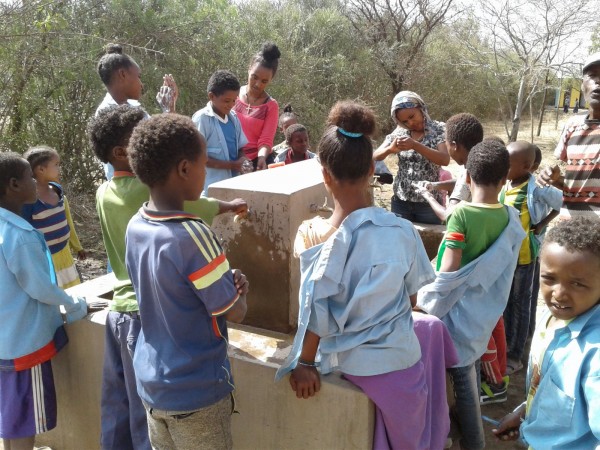
Today we know that the childhood years are decisive in the development of our personality, a time in which the capacities that we will develop as adults are shaped. The experts say that in the growth and education of children, two chief areas are involved: family and school.
I would like to emphasize the importance of school and, above all, examine how we can take advantage of the school environment to achieve a real improvement in the living conditions of children.
In Meki (Ethiopia) we are carrying out an education program on disease prevention in three rural schools in the area. We give weekly lessons to each course, from first level to eighth. Teachers have made room in their tight programs for our lessons because they consider it very important that children learn healthy habits such as washing their hands with soap, personal hygiene care, and lessons on environmental health: recycling, using trash cans...
Some of the things we teach have an immediate application: unclogging stagnant waters to prevent malaria-transmitting mosquitoes from laying their eggs on them; washing hands with soap; purifying drinking water and storing it in clean and covered containers, so that it may not be contaminated with dust or bacteria that will cause diarrhea. These are actions that, while being very simple, can have very important results.
Other times it may seem that we teach the students too much: when we talk about cleaning the environment or the use of litterbins, realities that are far from the everyday context of these children. In Meki there are no sewage systems, much less a habit of recycling. Here, objects which have become useless only have two possible destinations: they are either burnt or thrown on the ground.
However, we insist on all these contents with the conviction that although our students do not have many means now, perhaps they will have them in the future, and then they will remember what they are learning today at school. What a great achievement would it be if, little by little, the children and young people of Meki were gaining a strong environmental consciousness! The fruits of good practical education are truly unpredictable.
The new mayor of Meki visits the educational center of the Community of St. Paul in Meki, Ethiopia
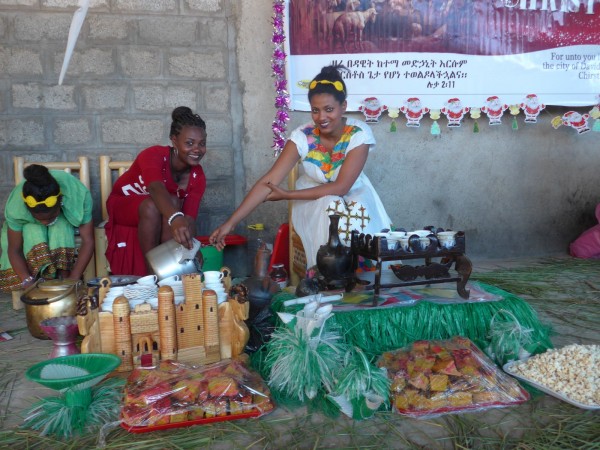
María José Morales tells us, from Ethiopia, about the recent visit of the new mayor of Meki, and the impact of the growing political parity between men and women in the country.
«Yesterday we had a surprise visit at the Kidist Mariam training center. Without any previous notice, two young people arrived; they were very interested in knowing the center and its work, and it turned out that they were the new mayor of Meki and the person in charge of the District. The students told them the courses in which they are trained, and the visitors thanked them for the explanations and encouraged them to persevere in their formation.
You can already imagine how happy our students were to have met the new mayor: "She's very young ... and she's a woman!" They said. The appointment of the mayor of Meki is part of the changes that are taking place at a social and political level in the country since Abiy Ahmed was appointed the new Prime Minister of Ethiopia, at the beginning of last April.
Many women have been appointed to important political positions, and that encourages our young students. In fact, at the end of September the formation of one of the few parity governments in the world was announced, with 50% of ministers being women (occupying, among others, the ministries of defense, trade and peace). The Ethiopian parliament also unanimously elected lawyer Meaza Ashenafi as the first female president of the Federal Supreme Court. At the beginning of October, the diplomatic Sahlework Zewde was elected president of the country, becoming the first woman to occupy the Ethiopian head of State, currently the only one in the whole of Africa.
Finally, at the end of November the opposition leader Birtukan Mideksa was elected president of the National Electoral Board.
And it is in this context that now we have a female mayor in Meki. In the courtyard of the center, when the students left after finishing their classes, the young Tigist approached me and with a big smile she said: "I've changed my mind, I do not want to cook anymore... Now I want to be mayor!"»
The Community of Saint Paul continues to promote job training for young people in Ethiopia
Throughout 2018 the "Kidist Mariam" center in Meki, Ethiopia has continued to offer cooking, sewing and hairdressing courses. Most of the students are young people who for various reasons could not finish their studies, or who have returned to Ethiopia after working in Arab countries. A total of 444 students have attended the courses this year: 88 in cooking, 131 in sewing and 225 in hairdressing. We are very happy to report that of these 444, 231 are already working in restaurants, or as hairdressers, or in industrial sewing plants or in sewing and hairdressing cooperatives created with other students.
It is a satisfaction to see that so many graduates from the center are finding work opportunities. Their experience encourages the center's team to continue training more young people professionally.
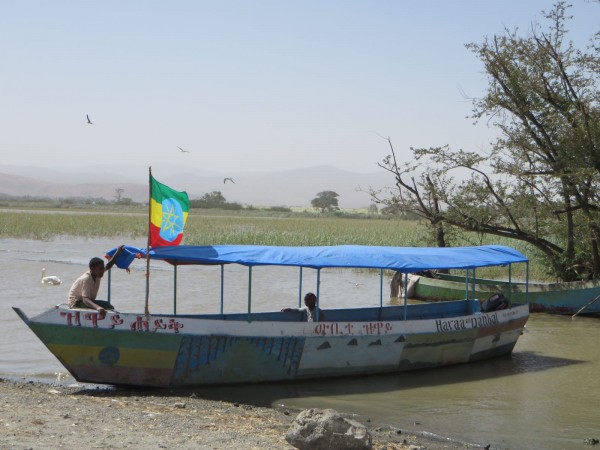
From Meki (Ethiopia), we want to share with all the readers of Agora XXI the joy of the most important political event in recent years in this country, which many may have already read in the press: we are talking about the peace recently signes between Ethiopia and Eritrea.
After two decades of hostilities and broken diplomatic relations between the two countries, the "end of the state of war" and a declaration of "peace and friendship" have now been signed. Ethiopia and Eritrea were in conflict since, after Eritrea gained independence from Ethiopia in 1993, border tensions ended in an open war between 1998 and 2000. In 2000 an agreement was signed (the Algiers agreement), in which both parties committed to accept the border lines established by the Border Commission of Ethiopia and Eritrea. However, Ethiopia soon changed its position when the commission decided to grant Eritrea the city of Badme, the epicenter of the war.
The relations between both African countries did not advance until last April, when Abiy Ahmed was appointed as the new Prime Minister of Ethiopia. We applaud this development, so relevant to the welfare and economic development of the two countries and all its people, including all the inhabitants of our region. We hope that the new leadership of the country will bring many good news for all of its people.
Inauguration of a Water Pump for 10,300 Inhabitants in Ethiopia
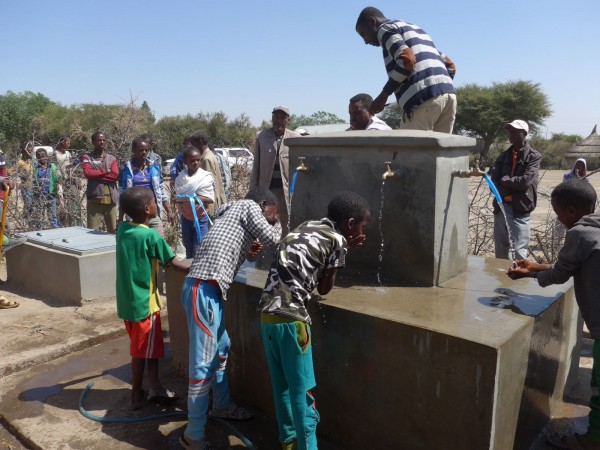
In the rural area of Korke Adi, in the Rift Valley in Ethiopia, the Community of St. Paul has been working for two years with women’s savings groups (that is, groups comprised of around 25 women each, who meet every two weeks to combine their savings, which will serve as a social fund to cover imminent needs as well as to establish small businesses).
A while ago, women from these groups and their families asked the Community of St. Paul to help them extend for 8 kilometers the existing water lines from the city of Meki until their village. They complained that there was a high fluoride concentration in the underground water that they were using, and that it gravely affected their health. The solution they proposed was to dig an 8 kilometer ditch and install pipes so that water now serving Meki could reach Korke Adi. We accepted the challenge.
At three different points in Korke Adi, pumps were built and elevated tanks, each with a capacity of 10,000 liters, were erected. In each location, they established a water committee in charge of distribution and maintenance of the pumps and tanks, as well as collection of a fee for water consumption. The fee is indispensable because it allows the project to remain sustainable.
Recently, the three fountains were inaugurated: there was a big feast to celebrate the event, with the presence of the Bishop of Meki, the local authorities, and the entire Korke Adi population. Thanks to this project, the 10.328 inhabitants of the area now have access to drinking water.
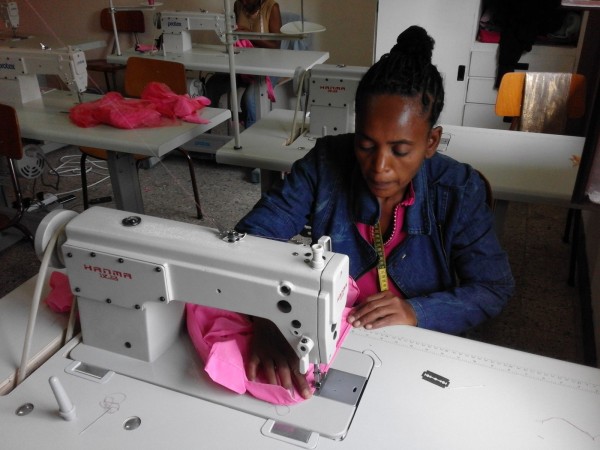
The Community of Saint Paul, through its courses of professional training, has assisted in the creation of a sewing cooperative in Meki, Ethiopia.
Last February, 45 students graduated from cooking, painting and sewing at our "Kidist Mariam" center. Then, ten of the young graduates of sewing classes decided to create, in our same center, a cooperative to make school uniforms. Uniforms are required in all schools in the country, and there are 15 schools, only in Meki. They began to work, and the first order they received was to produce 597 uniforms, for the community school in the neighborhood of Oda. In July the members of the cooperative took the measures to the students, and to this day they are finishing the uniforms, because the course will begin on September 28 and being such a big order, they are just time.
The word about this service has spread, and new orders have already arrived from other schools in the rural area. We are very glad about this new sewing cooperative, and we see that they will not run out of work!
On May 24, the new cathedral of the Apostolic Vicariate of Meki, in Ethiopia, was dedicated with great solemnity
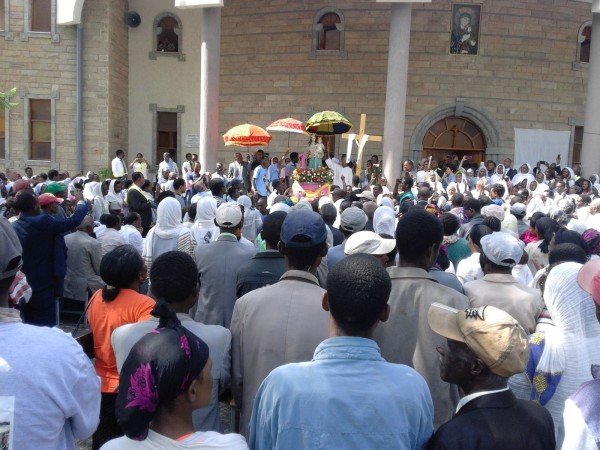
Since 2013 the Community of Saint Paul has been working in the Apostolic Vicariate of Meki, which covers 45,000 square kilometers and has a population of 4,000,000 inhabitants, of which Catholics represent less than 1%. In spite of this, the vicariate is committed to pastoral work and advocacy of human dignity through multiple social initiatives that touch the entire population.
On May 24, just a couple of weeks ago, we were pleased to participate in the solemn dedication of the new cathedral of Meki. The construction of the cathedral was a project dreamt about by many people for many years. Therefore, last month’s dedication was an especially joyful celebration in which nearly 4,000 people participated. It surely was not a short festivity: given the solemnity of the occasion, the Eucharistic Celebration in which the new cathedral was formally consecrated lasted six hours! The building was filled to overflowing, and a large screen projected the celebration for those outside. In addition to the Bishop of Meki, Msgr. Abraham Desta, the Archbishop of Addis Abeba, Cardinal Berhaneyesus Souraphiel, the Apostolic Nuncio, Msgr. Luigi Bianco and the Bishop Emeritus of Trent, Italy, were all present. Also in attendance were representatives from organizations that contributed financially to the construction, such as Caritas Austria and the Diocese of Trent. The Spanish Episcopal Conference also collaborated with the project.
After the Eucharist, the reception, organized by the Community of Saint Paul, took place in our Training Center. Our students, especially those who are studying cooking and food preparation, helped with the reception. It was a great celebration. We hope that the presence of this beautiful and dignified cathedral will be a seed for the propagation of the word of God in these lands of ancient Christian tradition.
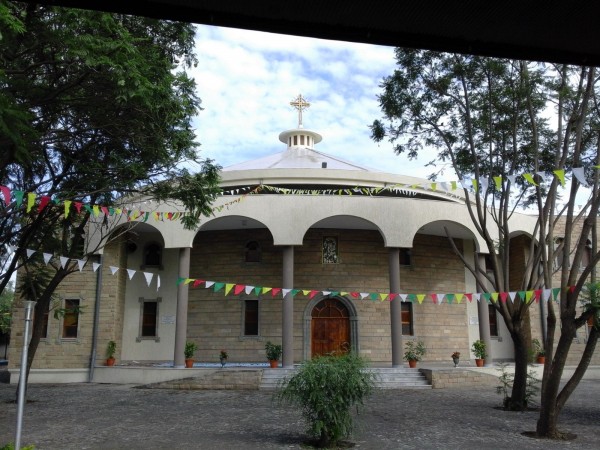
The Professional Training Center of Meki, Ethiopia, celebrates the end of the semester with a trip
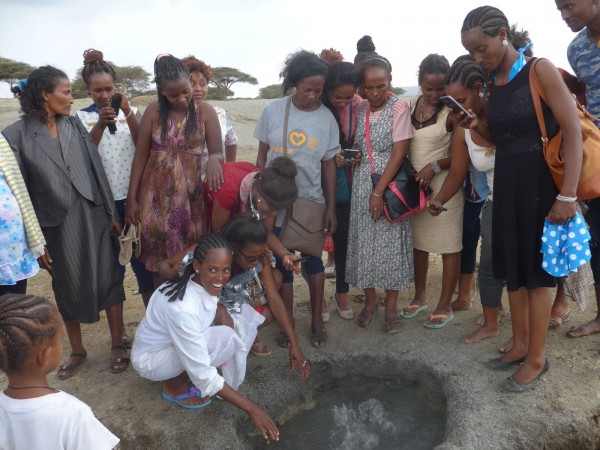
What better way to celebrate the end of the semester with our cooking, sewing and hairdressing students than to take a trip!
The city of Meki is located in the Rift Valley, in Ethiopia. Koka, Zway, Abiyata, Shala and Langano Lakes are all located along the 215 kilometers of highway that goes from Addis Ababa toward southern Ethiopia. We went to visit the flamencos, marabous and herons in Lake Abiyata and the thermal waters near Lake Shala. In spite of being only 85 kilometers away from Meki, our students had never visited the nature preserve in this area; some of them didn’t even know of their existence.
We boarded two buses with food prepared in advance at the Training Center. Our students were dressed so elegantly that it appeared that we were going anywhere but an outing to the mountains and lakes. A few telephones were prepared to photograph every moment of the outing. When it was time to walk on the trails, most of the students took off the elegant shoes they were wearing, and went barefoot. Along the way, one of our buses got trapped and stuck in one of the sand paths, and we had to wait a good while until the driver, with the help of local people, was able to get back on the road. While waiting, the other bus became a dance floor for those that preferred to dance rather than wait under a tree. After strolling and seeing camels, wild boars, ostriches, an endless number of flamencos and marabous, we ate together and washed the plates with hot water from a nearby creek (that had formed from the thermal waters).
The biggest surprise of the trip was to see the natural Geysers that had formed along the side of the lake. On holidays, the area is filled with people who put bags of potatoes and eggs in the water and eat them after they have boiled. I think on our next trip, we will do the same!
We enjoyed the day and the pleasant atmosphere that the students help create, laughing, talking, helping each other and experiencing the marvels of nature that are so close to Meki, their city. The outing was very positive, even though the next morning more than a few students missed class because they said they were exhausted from all the walking and dancing of the previous day!
Students enrolled in our center celebrate the completion of their formation in cooking, sewing and painting
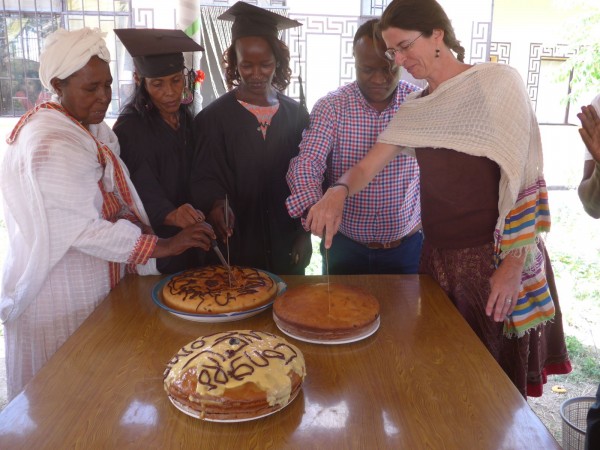
A year ago, the Community of St. Paul initiated a work training program for women and young people in the Vicariate of Meki, Ethiopia. María José Morales, the person behind this project, reports now the following:
«Saturday, February 18, was a great day for our training center... a real event! There aren’t cameras or videos or gestures or words that can express what the graduation meant for our first forty students. The week before graduation they created committees in charge of preparing the celebration: a teacher and three students from each course. The rest of us helped however we could, decorating the center, preparing songs, obtaining the graduation uniforms —that we just couldn’t do without— and setting up a big tent in which we could welcome our guests and prepare cookies, coffee and food for the 200 people who participated in the celebration.
On graduation day, the first to arrive were the heads of the committees to ensure that nothing was missing. Then, the students, wearing their uniforms, arrived with their families. For them, being able to graduate, to have a profession, to invite family and to be photographed receiving their certificate from the Bishop of the Vicariate of Meki and the director of the center... all of it, it meant more than we can imagine. These young people hadn’t finished their studies and had scarce work opportunities; now they graduated as cooks, seamstresses and painters. Some were already working, thanks to the training they had received. They were all radiant with happiness and enthusiasm.
Emabet —one of the students— thanked us for the opportunity the center gave her and many others to study a profession after having returned from an Arab country. When these students returned, they were rejected by their families and found no job opportunities. They were discouraged for not having achieved the “better future” that they had hoped to find when they emigrated. Emabet is now a cooking teacher at our center, and other students are now working in local hotels. The sewing students made their first delivery of uniforms to a nearby daycare center and have formed a cooperative in order to make the uniforms that are required in schools throughout the country. At the present time, we have an order for 500 student uniforms and 50 teacher uniforms.
It is difficult to communicate the happiness of the families who accompanied their relatives on such a special day, as well as our happiness after having worked so hard and with so much enthusiasm throughout the year to make this moment possible. We have all “graduated a little” with our students, and wish the best for them in this new stage that they begin their life as professionals».
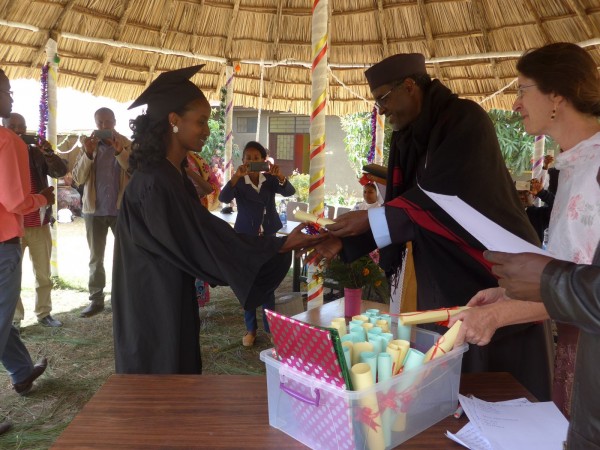
Youth who return to Ethiopia from Arab countries are trained in Meki at the center run by the Community of Saint Paul
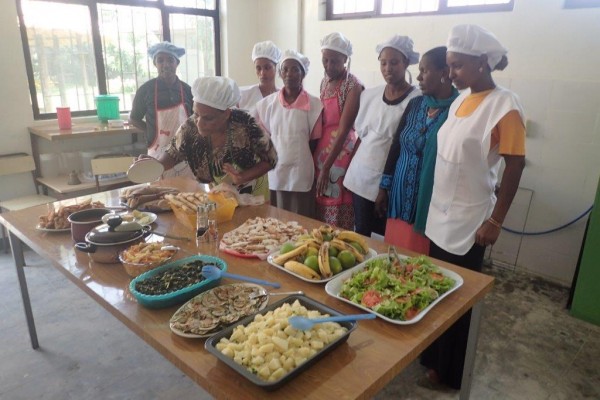
In August 2016 we began new cooking, sewing and hairdressing classes in Kidist Mariam Center, the training center that the CSP runs in Meki, Ethiopia. We also began Level II courses in sewing and cooking, and the number of students increased to 93. Over the course of 2016, we will have trained 160 women, and we celebrate that this can happen.
The majority of our students are young people who weren’t able to finish their studies, and now, due to their lack of training, do not have adequate jobs. Among them, we have a group of young 18 women who are back in Meki after having emigrated to Saudi Arabia or to Lebanon in search of work to support their families. In Ethiopia, many try this route to escape from poverty. However, in most cases, where they arrive to their destinations they find very different reality from what they expected: in the Arab countries they suffer all kinds of mistreatment and humiliations, and the opportunities are not as great as they thought.
Faced with this exploitation of immigrant women, Caritas International opened several shelters for young immigrants in the Arab countries. The young women who escape from these situations and arrive at the shelters receive psychological and material support and are supplied with documents so that they can return to their countries. Those who return to Ethiopia are received in a shelter in Addis Ababa. From there, they are connected with relatives, to try to reintegrate these young women back into their families. The work of reinsertion is complicated because many times they are rejected by their relatives. The families sent young, healthy daughters, filled of vitality, who many times return with babies and are psychologically very affected by the abuses they suffered during their journey.
The returned students who are at our center participate in training courses of sewing and cooking, while the Vicariate of Meki continues to work to reunite them with their families. In the classrooms they join other young people of their same age, many of whom lived through similar experiences. It’s amazing to see the interest they have in learning and their happiness at being treated with respect and valued for their talents. Upon seeing them, it’s hard to imagine the many difficulties they have endured in recent years.
Last Sunday, the owner of a new hotel near Meki invited us to eat at his restaurant so that he could show us his gratitude for his new cooks, Kasech and Zenafakech. They are two of our students in Level II cooking, both of whom returned from Lebanon. The food, service and attention we received were excellent. We were all very satisfied: our students, our boss, their cooking instructor and us.
We hope that, like Kasech and Zenafaketch, many other young women from our center can find good work. May they serve as an example so that those that continue thinking of emigrating to Arab countries know that, right here in Ethiopia, they also can have a good future. From the Kidist Mariam Center, we will continue working so that may be possible.
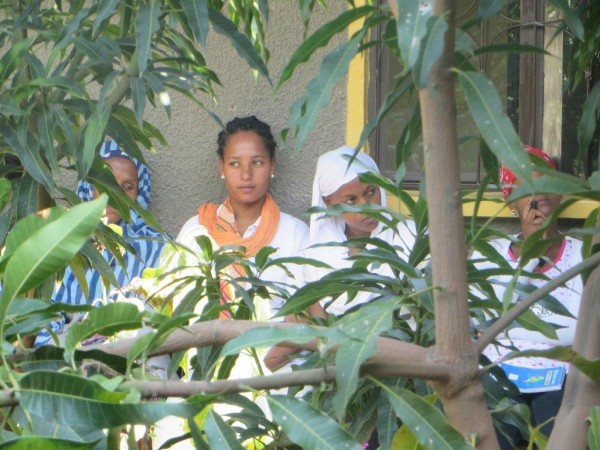
More than two years ago, members of the Community of St. Paul embarked in the project of bringing drinkable water to the 16,000 people living in the town of Wonji, Ethiopia. Today we celebrate that this dream, has become a reality.
In the first phase of the project, a water pump was bought and installed in a well near the Awash River and a tank was built to store the pumped water. In the second phase of the project, we carried out the work of channeling 4,400 meters of pipes from the tank to the town of Wonji. In September, two public fountains were built in the village and a water committee was formed and trained to take care of the maintenance, repair and administration of the water supply for the inhabitants of Wonji.
Finally, the fountains were inaugurated with great expectation on the part of the community. It is difficult to express in words the excitement that filled everyone as they saw the long awaited water flowing from the fountains. Today people in the town speak of how things have dramatically improved since the moment families had access to water near their homes, and how their lives have changed. We rejoice with them, and give thanks to all those who made this project a reality.


In the rural villages of the Dugda District (Ethiopia) there are no health services. The sick must travel in a cart pulled by mules or horses to Meki, the capital of the district, located 15 miles away. Now, however, in the towns of Grissa y Meja Lalu, the 451 children of the “Mary Catholic School” and the “School of the Holy Spirit” can count on primary care and health education.
Indeed, in these two schools a classroom has been renovated by the Community of Saint Paul in order to conduct medical exams, monitor nutritional status and deworm all of the children twice per year, as well as treat them when they are sick. Furthermore, health education classes have been initiated as part of the academic load of the children. These classes are intended to teach the children about healthy habits available to them so that they will become sick less often. Educating children about basic hygiene and sanitation can significantly reduce water borne illnesses as well as malnutrition.
Due to the great need for training for young women in Meki (Ethiopia), the Community of St. Paul has conceived, organized and started the Kidist Mariam Maakel, or “Saint Mary Capacitation Center”. With this new project we wish to help women who haven’t been able to finish their education to learn a profession in which they can work in a dignified manner and become self-sufficient. The center opened on February 1, and currently we are offering courses in cooking, sewing and painting (each lasting six months). At the inauguration of the center, the Bishop of Meki, Msgr. Abraham Desta, blessed the building and all who were present. Then, following the Ethiopian tradition, we prepared coffee and shared bread with the participants. The first group of students is comprised of 56 young women from Meki. We hope that they are able to develop the many talents and potential that they possess, and will keep you updated with news from the center.
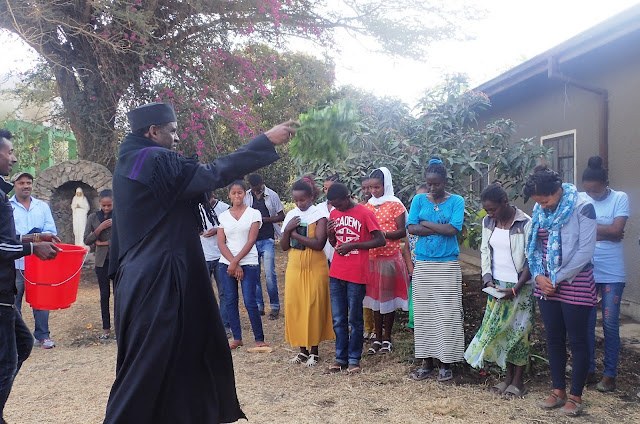 |
| Bishop Desta during the blessing of the new center |
According to a study conducted by the UN and the Ethiopian government, more than eight million people in Ethiopia need food assistance, as two consecutive years of drought have affected several regions of the country.
More than 80% of the Ethiopian population works in agriculture, which continues to be the prime financial income of the country. For that reason, the always tenuous situation becomes even more complicated when there are droughts. At present, in addition to drought, there is another equally dangerous threat: meteorological agencies have warned about possible strong rains and flooding in the next weeks, which would destroy the existing harvests and worsen the situation even more.
Thirty years ago, in the 80s, Ethiopia suffered a great famine that drew world attention. Since then the country’s economy has been improving up to the point of positioning itself among the emerging economies of Africa. However, in spite of the development of schools, roads, and hospitals under the current government, which has been in power since 1990, many people continue to live in extreme poverty. They are now experiencing more and more cases of infant malnutrition. Even though the government has begun to distribute sacks of grain and wheat among the affected communities, Ethiopians are hoping, once more, for help from outside to be able to overcome this new food crisis. For our part, we will continue contributing with our Community’s projects to strengthen the health and living conditions of the rural population in the area of Meki.



